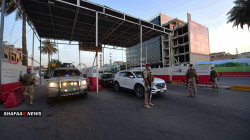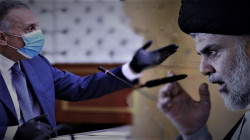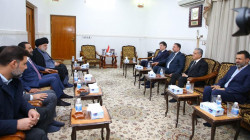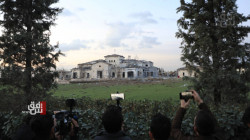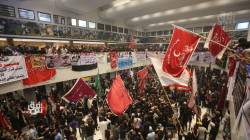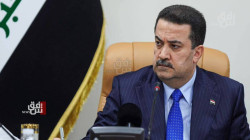Iraq's post-Arba'een phase: where to now?
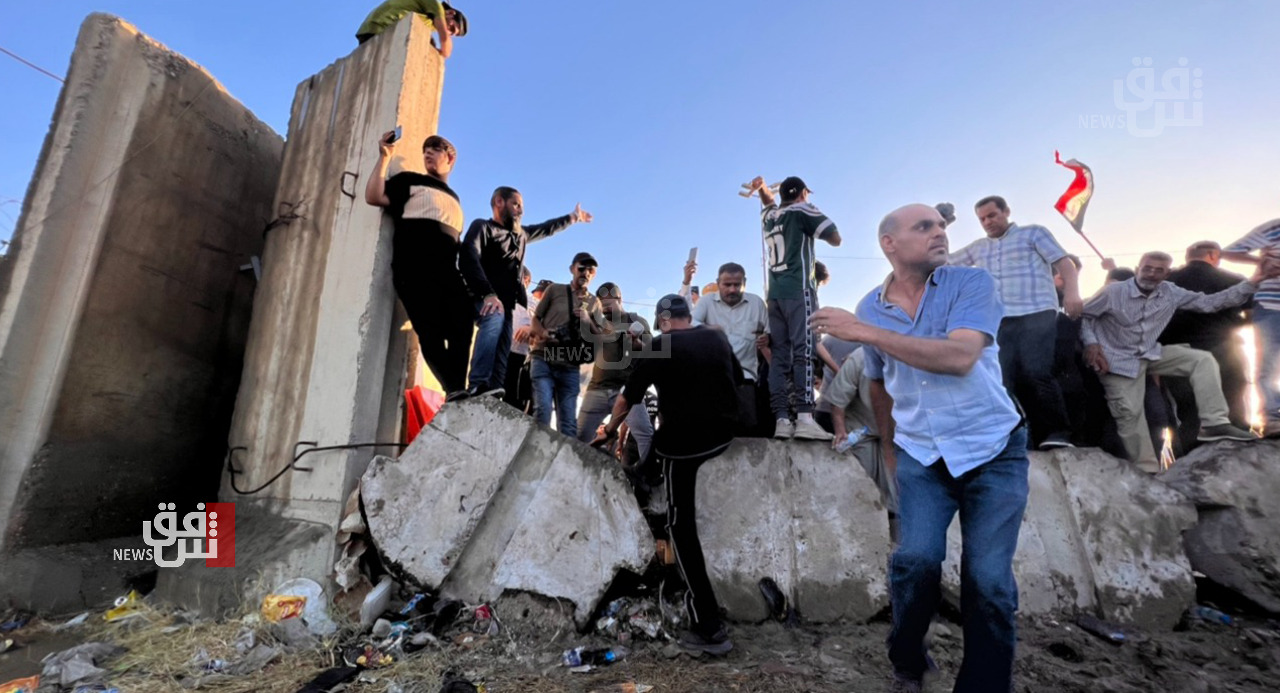
Shafaq News / Before the Arba'een, the Shiite landscape in Iraq could be summarized as "what religion unites, politics divides."
The atmosphere shifted from threats and firearms to a religious march to Karbala, where Imam Hussein is buried, to participate in the Arba'een pilgrimage.
That turn of events threw all Iraqis, and Shiites in particular, into a state of trepidation in expectation of the volatile political arena and hoping for a calm winter.
The Arba'een truce
The common religious-sectarian affiliation of the Coordination Framework and the Sadrist movement appears to provide an "undeclared truce" in the current phase of "peace" preceding the "fulfilling of vows" following the Arba'een.
Followers of the Tishreen revolution will return to the demonstration squares, positioning Iraq for a political clash that could escalate into an armed conflict.
It is unavoidable to find the current conflicted parties (Sadrists, Framework supporters, and Tishreen revolutionaries) marching together to Karbala amid the crowds of pilgrims commemorating the Arba'een. They may even work or rest next to one other in one of the Mawkebs.
However, their political affiliations remain vivid in their minds because this pilgrimage is only a brief truce. When Saturday ends, they will return to the same government maze.
"Aimlessly wandering"
While roaming in Baghdad, all you can hear is talks about the Arba'een. The capital's jammed streets appear to be particularly interested in the pilgrimage's spirit, while others who did not participate in the Mawkebs are preparing for the post-Arba'een phase.
Mohammed, a resident of al-Salhiya, an area near the Green Zone, recalled the "horror" of the violent clashes that lasted almost two days inside the Green Zone.
"Anything can happen after the Arba'een because everyone is ready to pounce on the other," Mohammed told Shafaq News Agency. "The Coordination Framework wants a parliamentary session and a new government, which is totally rejected by the Sadrists and Tishreen supporters.
"We are wandering and drifting without a clear purpose, with no clue where the events will bring us, and despite our wishes that things will be peaceful, everyone is determined to resume and finish the race."
Cemeteries make no distinctions
Um Mojtaba, who lives in the Green Zone with her husband and four children, stated, "what happened in August made us seriously consider leaving and taking sanctuary in another area, but my children's schools start shortly, so we can do nothing except live besieged by terror."
"The current scenario is like a ticking bomb, and everyone is waiting for the zero hour," she continued, stressing, "the only losers in these battles are the mothers. We see our children fall before our eyes, following in the footsteps of all those who have fallen, to the Najaf graveyards, which make no distinction between Sadrists, Coordination Framework followers, or Tishreen supporters."
The message is delivered
The phrase "message was delivered" seems to have been used for the first time by Muqtada al-Sadr during the "rehearsal" of the storming of parliament by Sadrist demonstrators, precisely on 27/7/2022. A statement in which he urged his supporters to end the demonstrations they had arranged before the start of the "Ashura revolution," in order to actually begin delivering the "message" by entering parliament and the subsequent protests up to the day of confrontations, (29-30) August 2022.
However, this message appears to be incomplete, given Sadrist determination to finish what they started after the Arba'een with an open status to all possibilities. Individuals interviewed by Shafaq News Agency revealed a Sadrist "wound" from the Green Zone events in their intention to compensate for what happened and prevent the Framework from forming a new government in demonstrations dubbed "the return."
The phrase "message delivered" appears to have been "recommended" by the Coordination Framework as well, and was used by Asa'ib Ahl al-Haq leader Qais al-Khazali, specifically on 1/8/2022, after anti-Sadrist demonstrations preceding the "Ashura revolution".
They also seem to continue delivering the "message" by seeking to form the government and hold a parliamentary session, even if it may anger their Sadrist and Tishreen opponents.
The last to use this statement were Tishreen supporters, who also demonstrated near the Green Zone after the clashes ended. They also threatened with it, pledging to resume their protests after the Arba'een, precisely on 1/10/2022, chanting their "The people want to overthrow the regime" mantra.
With that, the protest process's pillars have been finalized and are ready for the kickoff whistle.
"The message is delivered" was said by all parties, but it also seems to carry a lot of turbulent political, security, and social conditions for Iraqis.
"Armed clash" might erupt after the Arba'een
According to political analyst Ghaleb al-Daami, "after the Arba'een, and if the Coordination Framework insists on proceeding with the formation of the government without the Sadrist movement's consent to do so, the Sadrists' will take the streets and enter the Green Zone again."
"Tishreen will launch a fresh popular escalation after the Arba'een, and this escalation cannot be overlooked. The scenario following the pilgrimage is likely to entail a variety of developments and surprises, with Tishreen and Sadrists joining the expected protest."
The political analyst warned, "The possibility of another armed clash is not ruled out," adding, "everyone should be cautious. Any escalation could result in an all-out armed conflict."
Actions both on the ground and on social media
Baghdad is experiencing a "cautious tranquility", especially following the Green Zone events, after which the "loading weapons" phase will begin in preparation for the post-Arba'een.
Everyone appears to be prepared for the next stage following the Federal Court's decision on September 7, that no authority in the country may "extend the constitutional periods forever" and that it is not within its competence to dissolve the Iraqi Council of Representatives.
The first movement on the ground was the Baghdad Operations Command's announcement on September 10, to temporarily close the Jumhuriya Bridge in the center of the capital for maintenance.
According to Shafaq News agency's correspondent and eyewitnesses who passed by the bridge, security forces may try to erect an iron or electronic gate to prepare for the upcoming protests.
It is worth noting that the Jumhuriya bridge was the main entry point for Sadrists into the Green Zone, despite the Framework's "resentment" that accused al-Kadhimi's government of repeatedly failing in this regard.
What supports this view is what was revealed by pro-Sadrist platforms that this "gate" will not stand in their way to parliament to prevent holding sessions and forming a future government led by the Framework.
Little by little, the situation escalated after Nouri al-Maliki tweeted, "There is no need to talk about dissolving parliament anymore; the judiciary ruled that out, and this means no early elections until the House of Representatives resumes its sessions and forms a new government."
Al-Maliki said, "Political forces have indicated their support for the judiciary's ruling and have proclaimed their opposition to the dissolution of parliament and the early election. This means there is no need to discuss this constitutionally, judicially, and politically decided issue," calling for "dedicating speech, efforts, and proposals to activate the parliament and accelerate the formation of a coalition government to achieve the best services and political and security stability."
In response to al-Maliki, Haider al-Abadi tweeted, "Any path based on breaking the will be a scourge on the people and the state," calling for reaching a political agreement that recognizes the current situation as a transitional period, starting from the formation of a government and ending with the dissolution of parliament and holding an early election."
According to al-Abadi, "the interests of the people and the stability of the state are more valuable than any partisan or factional interest."
The Sadrists did not let al-Maliki's tweet pass unnoticed, as Sadrist leader Sabah al-Saadi "despised" the State of Law Coalition leader's statement on moving forward with the formation of the next federal government.
In a tweet, al-Saadi applauded Muqtada al-Sadr's statements, "Some tweets have the power to change governments and shock people. They are utterances that upset tyrants' thrones, are anticipated by states, and scrutinized by intellectuals."
Al-Saadi also mentioned al-Maliki's tweets, stating, "Some tweets appear to be part of the leaks produced by the conspiracy mentality," adding, "These are not even words. They are nothing but extra useless letters."
The Framework Vs. Sadrists-Tishreen
According to political researcher Ihsan al-Shammari, "the Sadrists will act as soon as a date for a parliamentary session is determined, if it does not include, at the very least, the condition for the dissolution of parliament next year."
He said, "Tishreen and its forces will be present as well, as it is more than just a dualism of the Framework and the Sadrist. Suppose the Framework proceeds to form a government that does not correspond to al-Sadr's proposal, which includes keeping the current president and prime minister and having the United Nations supervise the elections. In that case, I believe the next government will not last long and will face many difficulties from the Sadrist movement."
The Sadrist movement had voiced no opposition to conducting an early election with Barham Salih as president and Mustafa al-Kadhimi as prime minister. Still, the Framework, which sought to replace al-Kadhimi permanently, rejected that request.
"If the Framework forms the next government, it should prepare for an open confrontation with Sadrists and Tishreen followers, which may cost the Framework its government," al-Shammari continued, expressing his "belief that the Sadrists will not accept being excluded, and a political clash may erupt in the coming days."
Where is Iraq heading?
The American Middle East Institute presented a pessimistic picture of the current Iraqi impasse, believing that, while the country has retreated from the brink of civil war, the approaching end of the Arba'een, doubts about the outcomes of the national dialogue sponsored by al-Kadhimi, and the refusal of political forces to concede and compromise, could push Iraqis to fight again.
After referring to the clashes on August 29 between the Coordination Framework forces and the Sadrist Movement after al-Sadr announced his "final withdrawal" from politics, the US report stated that Iraqis spent that night "thinking the country was descending into a civil war between Shiites."
According to the report, this sectarian violence drew the attention of the US, citing President Joe Biden's contact with al-Kadhimi and his insistence on negotiation. In addition, US official Barbara Lev's visit to Baghdad and Erbil conveyed the same message, noting that "the Shiite authority has proven on many occasions its unwillingness to mediate in political conflicts, and that its intervention occurs when such conflicts threaten civil peace and force all parties to move away from the abyss."
"What is now likely is that the period following the Arba'een will see a surge in sectarian violence, including a campaign of reciprocal assassinations to settle old scores, and an increase in the costs to their opponents if this impasse persists," the report warned.
The report then referred to the two dialogue sessions al-Kadhimi has held this far, despite al-Sadr's boycott, and wondered "where Iraq is heading," before responding that "the political landscape remains tense, with both rival parties ready to resort to arms again," and that "both are currently stuck in an impasse, as neither side can impose a solution to end the political conflict."
